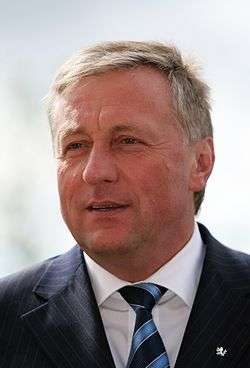European Conservatives and Reformists
| European Conservatives and Reformists | |
|---|---|
| European parliamentary group | |
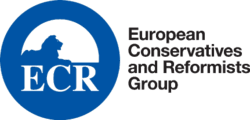 | |
| Name | European Conservatives and Reformists |
| English abbr. | ECR[1] |
| French abbr. | ECR |
| Formal name | European Conservatives and Reformists Group |
| Ideology |
Euroscepticism Anti-federalism[2] Conservatism Economic liberalism[2] |
| European parties | Alliance of Conservatives and Reformists in Europe[3] |
| Associated organisations |
Movement for European Reform New Direction |
| From | 22 June 2009[4] |
| To | present |
| Chaired by | Syed Kamall |
| MEP(s) |
73 / 751 |
| Website |
www |
The European Conservatives and Reformists (ECR)[1] is a Eurosceptic[5][6][7][8][9] and anti-federalist[4][5][10] political group in the European Parliament. The ECR is the parliamentary group of the Alliance of Conservatives and Reformists in Europe (ACRE) European political party (formerly known as the Alliance of European Conservatives and Reformists), but also includes MEPs from four other European parties and thirteen MEPs without European party affiliation.
The ECR was founded around the Movement for European Reform after the 2009 European elections at the behest of British Conservative Party leader David Cameron. During the Seventh European Parliament (2009–14), the ECR had 55 MEPs, making it the joint fourth-largest group. After the 2014 European elections, the party accepted thirteen new member parties, increasing group membership to 71 MEPs and making it the current third-largest group in the European Parliament.
The group is considered centre-right[11][12][13][14] to right-wing.[15][16][17][18] The largest parties in the group by number of MEPs are the Conservative Party of the United Kingdom and Law and Justice (PiS) of Poland.
Founding principles

The genesis of the ECR dates back to 2005, and possibly earlier. A political group in the European Parliament cannot be officially recognised if it contains MEPs from only a single member state. Instead, it must meet the minimum threshold required by the European Parliament's Rules of Procedure.[19][20] Any party seeking to create a group must therefore seek partners. The last mixed group in the European Parliament was forcibly dissolved. Since then, groups have been required to demonstrate ideological coherence. This is usually done by publishing a document (sometimes called a constituent declaration) stating the principles to which each group member is expected to adhere. The constituent declaration of the ECR has become known as the Prague Declaration. That document outlines the following principles:[21]
- Free enterprise, free and fair trade and competition, minimal regulation, lower taxation, and small government as the ultimate catalysts for individual freedom and personal and national prosperity.
- Freedom of the individual, more personal responsibility and greater democratic accountability.
- Sustainable, clean energy supply with an emphasis on energy security.
- The importance of the family as the bedrock of society.
- The sovereign integrity of the nation state, opposition to EU federalism and a renewed respect for true subsidiarity.
- The overriding value of the transatlantic security relationship in a revitalised NATO, and support for young democracies across Europe.
- Effectively controlled immigration and an end to abuse of asylum procedures
- Efficient and modern public services and sensitivity to the needs of both rural and urban communities.
- An end to waste and excessive bureaucracy and a commitment to greater transparency and probity in the EU institutions and use of EU funds.
- Respect and equitable treatment for all EU countries, new and old, large and small.
History
Origins: 2005–06
In 2005, the British Conservative Party held a leadership contest. During the sixth term of the European Parliament, Conservative Party MEPs sat in the European Democrats (ED), a subgroup of the European People's Party–European Democrats (EPP-ED) group, which is dominated by the European People's Party (EPP). Leadership contender David Cameron argued for withdrawal of the Conservatives from EPP-ED and the formation of a new group. Upon taking office as Conservative leader in December 2005, Cameron indicated that the launch of a new group would be undertaken immediately. In June 2006, Cameron ordered then-Shadow Foreign Secretary William Hague to ensure the new group was created by 13 July 2006.[22] However, when that date arrived, it was announced that the launch of the new European Parliament group was delayed until after the 2009 elections.[23]
Movement for European Reform
In the interim, a pan-European alliance, called the Movement for European Reform (MER), was founded and functioned outside of the European Parliament.[24] The same day, the Law and Justice and Civic Platform parties of Poland were identified as potential members of the new group: However, Civic Platform stated that it would not leave the EPP, and the Law and Justice stated that it planned to stay aligned to UEN.[25] The next day, Sir Reg Empey, the leader of the Ulster Unionist Party (UUP), suggested that the UUP could join the new group after the 2009 election.[26] In the event of the election, the UUP ran under the banner of the Ulster Conservatives and Unionists, an electoral alliance between the Conservative Party and the Ulster Unionists.
The Czech Civic Democratic Party (ODS) was part of MER but its leader, Mirek Topolánek, did not rule out staying in EPP-ED.[27] Topolánek then attended the EPP Summit (a meeting of heads of state and government of the European People's Party) of 21 June 2007, adding speculation about the fragility of the new group.[28]
In July 2008, the European Parliament raised the 2009 threshold for forming a group to 25 members and representing 7 member states.[29] Topolánek, after being re-elected Leader of the ODS on 7 December 2008, attended yet another EPP Summit, on 11 December 2008.[30]
2009 European Parliament elections
As the 2009 European elections approached, Cameron, Topolánek, and Conservative MEP Geoffrey Van Orden (a 'point-man' for the new group)[31] were looking for partners. The list of possible partners was kept secret.[32]
People or parties that were rumoured to be possible partners in the new group included Law and Justice;[33][34][35] Lega Nord;[33][36] the Danish People's Party;[33][36] For Fatherland and Freedom,[32][33] Order and Justice,[33] the Pensioners' Party;[37] Order, Law and Justice;[31][38][39] Libertas;[40] Civic Union;[41] Electoral Action of Poles in Lithuania,[41] ChristianUnion-SGP;[42] the independent Indrek Tarand;[41] and Lijst Dedecker's Derk Jan Eppink;[33][34] from member states such as the Czech Republic,[43][44] Poland,[43][44] Italy,[43] Sweden,[43] the Baltic and Balkan states,[43] Belgium,[44] and the Netherlands.[44] Speculation also considered the remnants of the Union for Europe of the Nations (UEN) group, which was thought to be on the verge of collapse after the decision of Fianna Fáil to join the Alliance of Liberals and Democrats for Europe (ALDE)[45] and the Italian National Alliance merging with EPP member party Forza Italia. Lajos Bokros, elected on the list of the Hungarian Democratic Forum (MDF) joined the group as the EPP did not want to accept him on pressure of the rival FIDESZ.
The new group was provisionally named the European Conservatives,[35] (echoing the 1970s group of the same name), which was then changed to European Conservatives and Reformists.[46] The original estimates were firmed up to 84 MEPs,[33] then to approximately 60.[44] Frictions surfaced, as the ODS wanted the new group to have as many MEPs as possible, whilst the Conservatives wanted to disbar anti-immigrant parties in the new group, including the Danish People's Party and Lega Nord.[36]
Formation
On 22 June 2009, the first official list of the new group's members was released.[10] On 24 June, the group held its inaugural meeting, in which Conservative MEP Timothy Kirkhope was named interim leader.[47] Adam Bielan of PiS and Jan Zahradil of the ODS were named interim vice-chairmen.
At the first sitting of the Seventh European Parliament, on 14 July 2009, outgoing Parliament President Hans-Gert Pöttering announced that applications from all new and returning groups had been received and approved, including ECR. The group then became eligible for EU funding, office space, and committee places.

The first election for the group leadership was also scheduled for 14 July 2009, pitting interim leader Kirkhope against fellow Briton Geoffrey Van Orden.[48] However, both Conservative leadership candidates were forced to forfeit the leadership in order to prevent it from falling apart, when then-Conservative MEP Edward McMillan-Scott defied his party whip and stood for one of the vice-presidency posts despite pledges the previous week that Polish MEP Michał Kamiński would be backed for it. Kamiński's bid for Vice-President of the European Parliament subsequently failed, and the Polish MEPs threatened to abandon the new caucus unless Kamiński was made the group leader in the parliament.[49] Kirkhope went to an emergency meeting with Polish MEPs in Strasbourg and proposed sharing the group leadership with the Kamiński; however, this was not accepted, and he had to step down as coalition leader, withdrawing in favour of Kamiński. McMillan-Scott, who alleged that the Conservative's new allies in Poland are 'racist and homophobic', had the Conservative whip withdrawn in the European Parliament.[50][51] In March 2010, McMillan-Scott joined the British Liberal Democrats and the ALDE group.[52]
Leadership changes and upheavals in membership
Group chairman Kamiński left Law and Justice (PiS) in November 2010, saying that the party had been taken over by the far-right. Kamiński and other Law and Justice MPs and MEPs formed a new Polish party, Poland Comes First, formed as a breakaway from Law and Justice following dissatisfaction with the direction and leadership of Jarosław Kaczyński. Kamiński initially remained of the group, but other Law and Justice MEPs argued he should step down.[53] On 15 December, rumours emerged that the eleven remaining PiS MEPs might leave the ECR and join the right-wing Europe of Freedom and Democracy (EFD) group instead.[54]
In February 2011, Kamiński announced he would resign his chairmanship, effective 8 March, when a replacement would be elected. Former interim leader Timothy Kirkhope was said to be the front runner,[55] but lost the election to Jan Zahradil of the Czech Republic's ODS.[56] Zahradil has been in talks with other parties about joining the ECR.[57] In late March, David Cameron invited the New Flemish Alliance (N-VA) to join the group.[58]
The May 2011 resignation of Silvana Koch-Mehrin, one of the fourteen Vice Presidents of the European Parliament, led to the ECR considering putting another candidate forward to take the position they were denied through McMillan-Scott's defection.[59] Conservative Party MEP Giles Chichester was nominated on 31 May, and was elected unopposed by the Parliament on 5 July 2011,[60] after the ALDE group to which Koch-Mehrin belongs failed to find a willing and suitable candidate.[61]
On 14 December 2011, a new leadership was elected, with Martin Callanan as Chairman and Jan Zahradil, Geoffrey Van Orden, Ryszard Legutko, and Derk Jan Eppink as Vice-Chairmen. On 26 December 2011, four members of United Poland – who had split from Law and Justice in November – left the ECR to join the Europe of Freedom and Democracy (EFD) group. On 17 January 2012, Czech Oldřich Vlasák replaced Chichester as the ECR's Vice-President of the Parliament.
2014 European Parliament elections
The 2014 European elections were held on 22–25 May 2014. On 4 June 2014, the ECR accepted applications from the Danish People's Party (4 MEPs) and the Finns Party (2 MEPs), both formerly attached to the EFD group during the 7th term of the European Parliament, as well as the Family Party of Germany, both Ordinary People and Independent Personalities (OĽaNO) and New Majority (NOVA) from Slovakia, and the Independent Greeks.[62][63] Alternative for Germany and Bulgaria Without Censorship were admitted on 8 June, followed by the Dutch Reformed Political Party on 16 June.[64] On 18 June the New Flemish Alliance (N-VA) joined the group,[65] a party previously attached to the Greens/EFA group.[66] N-VA party members had voted by a wide margin to join the ECR group instead of ALDE; 70 voted to join the ECR, and just three to join ALDE.[67] The N-VA's decision allowed the ECR to overtake ALDE as the third biggest group in the European parliament,[67] assuming the role of "kingmakers" in the new parliament.[68] On 23 June, Irish Fianna Fáil MEP Brian Crowley joined from the ALDE group, but without the permission of his party or its leader Micheál Martin, who removed Crowley's party whip the following day.[69][70] On the same day, IMRO – Bulgarian National Movement joined,[71] taking the group to 70 MEPs.
The ECR’s unanimous decision to admit the Danish People’s Party and Finns Party as members was criticised because one MEP from each party has a criminal conviction.[72][73] Morten Messerschmidt, lead candidate for the Danish People’s Party, was convicted in 2002 for publishing material that appeared to suggest that there is a link between a multiethnic society and rape, violence and forced marriages.[74] Jussi Halla-aho, a Finns Party MEP, was convicted in 2012 after writing a 2008 blog entry which claimed that Islam "reveres paedophilia".[74] However, Syed Kamall, the ECR's Chairman, who is a practising Muslim, defended the new members.[74]
Following the election, British Conservative MEP Sajjad Karim was the group's candidate for President of the European Parliament.[75]
On 8 March 2016, the bureau of the ECR Group began motions to exclude the two remaining MEPs of the Alternative for Germany (AfD) from their group due to the AfD's links with the far-right Freedom Party of Austria (FPÖ) and controversial remarks about immigration, inviting the MEPs to voluntarily leave the group by 31 March, with a motion of exclusion to be tabled on 12 April otherwise.[76][77]
Changes in membership
- On 2 October 2014, the leader of the Slovakian party Freedom and Solidarity (SaS), Richard Sulik, left the ALDE group to join the ECR,[78] and was formally accepted six days later.
- In November 2014, the sole Croatian member of the group, Ruža Tomašić, left the party she founded, Croatian Party of Rights dr. Ante Starčević, to lead a new party, the Croatian Conservative Party.
- On 24 January 2015, Amjad Bashir, the UKIP MEP for Yorkshire and the Humber, defected to the Conservative Party and subsequently joined the ECR.[79]
- On 18 May 2015, Raffaele Fitto formerly of Italian party Forza Italia and EPP group joined the ECR group: forming a party called the Conservatives and Reformists after the ECR.[80][81]
- On 7 July 2015, Remo Sernagiotto left the EPP to join the ECR.
- On 27 October 2015, Monica Macovei, from M10 political party left the EPP to join the ECR.[82]
- On 8 March 2016, Eleni Theocharous of the Cypriot Democratic Rally was admitted to the group from the EPP.[83]
- On 5 October 2016, Timothy Kirkhope quit after being created a life peer.
Conservatives and Reformists Summit
- 2015 Conservatives and Reformists Summit: Tunis (Tunisia) [84]
- 2016 Conservatives and Reformists Summit: Antalya (Turkey) [85]
Membership
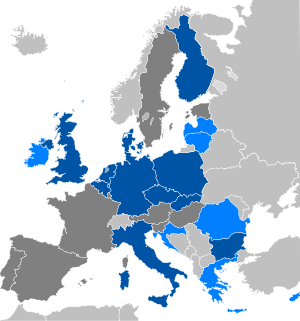
The ECR has 76 Members of the European Parliament, from twenty-three parties across eighteen countries. The ECR draws the majority of its MEPs from northern and central Europe.
Eighth European Parliament
Following the 2014 election, members from twelve new parties joined. Additional parties were admitted during the course of the Eighth European Parliament, such as Freedom and Solidarity of Slovakia and Conservatives and Reformists of Italy. Alternative for Germany was initially admitted, but expelled in April 2016.
- ↑ Rikke Karlsson left the DF.
- ↑ Bernd Lucke left AfD with 4 more MEPs after losing leadership of his party in 2015. The remaining two AfD members, Beatrix von Storch and Marcus Pretzell were expelled from the ECR group in 2016.
- ↑ Notis Marias left ANEL.
- ↑ Brian Crowley was the sole member of Fianna Fáil elected in the 2014 election; following his announcement that he was joining the ECR, Fianna Fáil withdrew the party whip. Crowley remains a member of the Fianna Fáil party as a whole, but has been excluded from its cross-Parliamentary caucus.
Seventh European Parliament
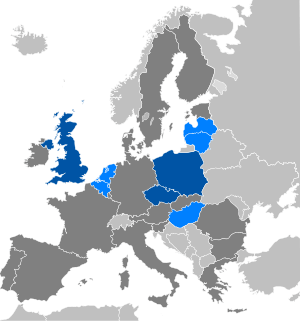
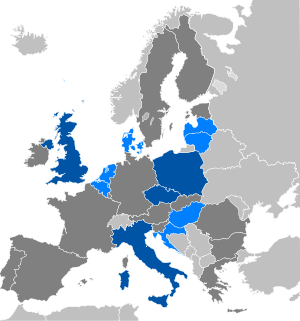
Originally, it had been announced on 22 June 2009 that Hannu Takkula, MEP for the Finnish Centre Party (a Alliance of Liberals and Democrats for Europe member party) would also be a member of ECR (with his two party colleagues remaining in ALDE), but he reversed this decision two days later.[86]
The group membership was reduced to 54 when Edward McMillan-Scott was expelled from the group in July 2009. It increased to 55 again when Anna Rosbach joined the group in March 2011.[87] UKIP MEP David Campbell Bannerman rejoined the Conservative Party in May 2011, taking the group's tally to 56:[88] one larger than The Greens–European Free Alliance - an advantage that disappeared in June 2011. Anthea McIntyre was confirmed as the ECR's 57th MEP on 1 December 2011. United Poland, which had been founded by four defectors from Law and Justice – Zbigniew Ziobro, Tadeusz Cymański, Jacek Kurski, and Jacek Włosowicz – left the ECR for Europe of Freedom and Democracy (EFD) on 26 December 2011. In March 2012, Conservative Roger Helmer defected to the UK Independence Party (UKIP) and also joined EFD; Marta Andreasen moved in the opposite direction, joining the Conservatives and the ECR from UKIP and the EFD group, in February 2013. In October 2012, Cristiana Muscardini joined the ECR, when she left Future and Freedom to found the Conservatives and Social Reformers. In April 2013, the ECR was joined by fellow Italian Susy De Martini, an independent who was formerly a member of The People of Freedom. The newly elected Croatian MEP Ruža Tomašić of the Croatian Party of Rights joined the group when Croatia joined the EU in July 2013.[89] In November 2013, Poland Comes First dissolved itself, with three of its members joining the new Poland Together, which was also joined by Artur Zasada from the EPP: taking the group's number of MEPs to 57. In 2014, Mirosław Piotrowski rejoined Law and Justice, and sought reelection in 2014 under that party's banner.
Leadership
Chairman
The ECR is led by a Chairman, currently Syed Kamall of the British Conservative Party.
There have been five Chairmen of the European Conservatives and Reformists group:
| Assumed office | Name | Party |
|---|---|---|
| 24 June 2009 | Timothy Kirkhope | |
| 14 July 2009 | Michał Kamiński | |
| 8 March 2011 | Jan Zahradil | |
| 14 December 2011 | Martin Callanan | |
| 12 June 2014 | Syed Kamall | |
Group Bureau
In addition to the Chairman, the ECR is led by three Vice-Chairmen and a wider Bureau, including the leader of each national delegation represented in the ECR.
Cohesion
According to calculations by Vote Watch Europe, the ECR group had a cohesion rate of 86.65% in parliamentary votes during the 7th session (2009–14). This is slightly lower than in the four pro-European groups, but higher than in the European United Left–Nordic Green Left (GUE/NGL) and far higher than in the Europe of Freedom and Democracy (EFD) groups. Internal cohesion was highest in votes on constitutional and inter-institutional affairs (94.79%), international trade, and industry, research & energy. The greatest divergence within the group was in decisions on regional development (70.53% cohesion), agriculture, and development (cooperation).[90] The parties that were most loyal to the group (meaning that they voted with the majority of ECR members the most often) were the UK Conservatives (97.51%), the Ulster Unionist Party and the Czech Civic Democratic Party. The members who deviated from the ECR majority the most often were the individual MEPs Andreasen from the UK (who had switched over from EFD group only in 2013; 61.20% loyalty), Muscardini from Italy, and Rosbach (who had crossed over from EFD in 2011).[91]
See also
- European Conservatives, an earlier political group of Conservatives in the European Parliament
- European Conservatives and Reformists Group Executive
- Movement for European Reform
References
- 1 2 "ECR formation - Press release june 22 2009". Scribd.com. 2009-06-22. Retrieved 2015-05-14.
- 1 2 Watson, Iain (3 June 2014). "New German party causes Cameron EU Parliament dilemma". BBC News. Retrieved 2014-07-03.
- ↑ Further MEPs from MELD, EFA, and ECPM.
- 1 2 François Foret (31 January 2015). Religion and Politics in the European Union. Cambridge University Press. p. 103. ISBN 978-1-107-08271-7.
- 1 2 Christophe Gillissen (2010). Ireland: Looking East. Peter Lang. p. 157. ISBN 978-90-5201-652-8.
- ↑ Ingo Peters (September 2011). 20 Years Since the Fall of the Berlin Wall: Transitions, State Break-Up and Democratic Politics in Central Europe and Germany. BWV Verlag. p. 277. ISBN 978-3-8305-1975-1. Retrieved 2013-02-06.
- ↑ Senem Ayd?n-Düzgit (15 December 2012). Constructions of European Identity: Debates and Discourses on Turkey and the EU. Palgrave Macmillan. p. 16. ISBN 978-1-137-28351-1.
- ↑ Hans Slomp (26 September 2011). Europe, A Political Profile: An American Companion to European Politics [2 volumes]: An American Companion to European Politics. ABC-CLIO. p. 245. ISBN 978-0-313-39182-8.
- ↑ Matt Cole; Helen Deighan (27 July 2012). Political Parties in Britain. Oxford University Press. p. 39. ISBN 978-0-7486-6903-5.
- 1 2 "Conservative MEPs form new group". BBC. 2009-06-22. Retrieved 2009-06-22.
- ↑ Andreas Staab (15 July 2013). The European Union Explained: Institutions, Actors, Global Impact. Indiana University Press. p. 69. ISBN 978-0-253-00976-0.
- ↑ Mulholland, Hélène (22 June 2009). "Tories unveil group of controversial new allies in European parliament". The Guardian. London. Retrieved 2011-03-05.
- ↑ "Conservative MEPs form new 'anti-federalist' group in the European Parliament". The Telegraph. London. 22 June 2009. Retrieved 2011-03-05.
- ↑ "Cuban dissident wins Sakharov Prize". European Voice. 21 October 2010. Retrieved 2011-03-05.
- ↑ Ingeborg Toemmel (22 September 2014). The European Union: What it is and how it Works. Palgrave Macmillan. p. 158. ISBN 978-1-137-42754-0.
- ↑ "EU parliament sees birth of new right-wing group", EUobserver, 22 June 2009, retrieved 2011-07-18
- ↑ "Tory minders gag right-wing allies in the ECR", The Times, London, 8 Nov 2009, retrieved 2011-07-18
- ↑ New-look European Parliament, BBC News, 3 Sep 2009, retrieved 2011-07-18
- ↑ "Rules of Procedure of the European Parliament, 7th parliamentary term - July 2009, Rule 30: Formation of political groups" 1 July 2009, from http://www.europarl.europa.eu/
- ↑ "Rules of Procedure of the European Parliament, 16th edition - March 2009, Rule 29: Formation of political groups" 6 April 2009, from http://www.europarl.europa.eu/
- ↑ "The Prague Declaration : European Conservatives and Reformists Group". Ecrgroup.eu. Retrieved 2013-09-07.
- ↑ Kite, Melissa (11 June 2006). "Cameron gives Hague month to get MEPs out of Brussels group". London: Daily Telegraph. Retrieved 2009-09-28.
- ↑ Kubosova, Lucia (13 July 2006). "Plans to form new MEP group kicked into 2009". EUobserver. Retrieved 2009-03-26.
- ↑ "Cameron Euro declaration". BBC News. 2006-07-13. Retrieved 2008-05-27.
- ↑ Mulvey, Steven (13 July 2006). "Q & A: The Tories and the EPP". BBC News. Retrieved 2008-05-27.
- ↑ "Could the UUP be ready to leave the European Democrats?". The Belfast News Letter. 2006-07-14.
- ↑ "Will Mirek really leave the EPP-ED?". EUobserver. 2007. Retrieved 2008-05-28.
- ↑ "16 Heads of State meet at an EPP summit". European People's Party. 2007. Retrieved 2008-05-28.
- ↑ "European Parliament increases threshold to form a political group". European Parliament. 2008. Retrieved 2008-08-24.
- ↑ "EPP calls on the EU for a solution for ratification of the Lisbon Treaty". European People's Party. 2008. Retrieved 2008-12-12.
- 1 2 "EU Conservatives Stand Firm behind Bulgaria's Order, Law and Justice Party". Novinite. 2009-04-05. Retrieved 2009-04-24.
- 1 2 "Those exceptional British". The Economist. 26 March 2009. Retrieved 2009-03-26.
- 1 2 3 4 5 6 7 Taylor, Simon (12 March 2009). "UK Conservatives to leave the EPP-ED group". European Voice. Retrieved 2009-03-11.
- 1 2 Moszynski, Piotr (2009). "La rupture conservatrice" (in French). Radio France International. Retrieved 2009-03-11.
- 1 2 Smyth, Jamie (13 March 2009). "Tories to set up new parliamentary group". The Irish Times. Retrieved 2009-03-26.
- 1 2 3 Charter, David (2009-06-17). "Tory party upsets Czech partners with choice of anti-federalist MEPs". London: Times Online. Retrieved 2009-06-22.
- ↑ Mardell, Mark (24 March 2009). "Tories look for new partners". BBC News. Retrieved 2009-03-24.
- ↑ "UK Conservative Party Leader Cameron Welcomes Bulgaria Opposition MP Yanev". Novinite. 2009-03-27. Retrieved 2009-04-24.
- ↑ Hix, Simon, Michael Marsh and Nick Vivyan (2009-04-23). "Predict 09 - Analysis by Member State - Bulgaria". Burson-Marsteller. Archived from the original on 2009-04-10. Retrieved 2009-04-24.
- ↑ "New conservative group to rock next Parliament". EurActiv.com. 2009-06-03. Retrieved 2009-06-03.
- 1 2 3 Traynor, Ian (2009-06-09). "David Cameron on track to form alliance of Eurosceptics". London: The Guardian. Retrieved 2009-06-09.
- ↑ "EU vote: CU/SGP may link to Conservatives". DutchNews.nl. 2009-06-08. Retrieved 2009-06-10.
- 1 2 3 4 5 Grossman, David (10 March 2009). "The Tories' European dilemma". British Broadcasting Corporation. Retrieved 2009-03-11.
- 1 2 3 4 5 Banks, Martin (25 March 2009). "UK Tories 'well on track' to forming new EU grouping". Theparliament.com. Retrieved 2009-03-26.
- ↑ Connolly, Niamh (15 March 2009). "FF to join liberal Euro group next month". The Sunday Business Post. Retrieved 2009-03-26.
- ↑ Charter, David (2009-05-15). "David Cameron's new European allies set to include odd bedfellows". London: The Times. Retrieved 2009-05-15.
- ↑ Banks, Martin (25 March 2009). "Tory MEP voices 'real concern' over new European grouping". London: Daily Telegraph. Retrieved 2009-07-22.
- ↑ Banks, Martin (9 July 2009). "British Tories fight it out for leadership of new Eurosceptic group". Theparliament.com. Retrieved 2009-07-10.
- ↑ Ian Traynor in Strasbourg (2009-07-15). "Tories give up EU parliamentary leadership of Eurosceptic group | Politics". London: guardian.co.uk. Retrieved 2010-04-27.
- ↑ "Conservatives expel MEP after row over right-wing bloc". The New Statesman. 15 July 2009. Retrieved 2009-07-15.
- ↑ "McMillan-Scott hits back at allegations of disloyalty". Theparliament.com. 15 July 2009. Retrieved 2009-07-16.
- ↑ "Ex-Tory MEP Edward McMillan-Scott joins Lib Dems". BBC News. 2010-03-12. Retrieved 2010-04-27.
- ↑ Conservatives' EU alliance in turmoil as Michał Kamiński leaves 'far right' party, The Guardian, 22 Nov 2010
- ↑ "Future of EU parliament group under renewed pressure". Theparliament.com. December 15, 2010. Retrieved 2013-09-07.
- ↑ "Conservative confusion". European Voice. 3 February 2011. Retrieved 2011-02-10.
- ↑ Taylor, Simon (8 March 2011). "Czech beats British Conservative to lead EP group". European Voice.
- ↑ "'ECR has moved from squabbling to stability'". European Voice. 7 April 2011. Retrieved 2011-05-23.
- ↑ "When Dave met Bart". European Voice. 24 March 2011. Retrieved 2011-05-23.
- ↑ "Jostling for position". European Voice. 19 May 2011.
- ↑ "Chichester and Podimata appointed vice-presidents". European Voice. 7 July 2011. Retrieved 2011-09-15.
- ↑ "Just the job for a liberal?". European Voice. 9 June 2011. Retrieved 2011-09-15.
- ↑ Barker, Alex (4 June 2014). "MEPs with criminal records join Tories' eurosceptic group". Financial Times. Retrieved 2014-06-04.
- ↑ Cerulus, Laurens (5 June 2014). "Cameron's group challenges liberals as kingmakers in new Parliament". EurActive. Retrieved 2014-06-05.
- ↑ "Belder in ECR". 2014-06-16. Retrieved 2014-06-16.
- ↑ Van Overtveldt, Johan (2014-06-18). "N-VA kiest voor ECR-fractie in Europees Parlement" [N-VA chooses ECR Group in the European Parliament]. standaard.be (in Dutch). Retrieved 2014-06-18.
- ↑ "Flemish MEP row reveals tensions in Greens/EFA group". EurActiv.com. 2014-05-25. Retrieved 2015-05-14.
- 1 2 "Liberals embarrassed as N-VA joins ECR, making it third largest Parliament group". EurActiv.com. 2014-06-19. Retrieved 2015-05-14.
- ↑ "Cameron's group challenges liberals as kingmakers in new Parliament". EurActiv.com. Retrieved 2015-05-14.
- ↑ Bardon, Sarah (2014-06-24). "Fianna Fail expel MEP Brian Crowley - Irish Mirror Online". Irishmirror.ie. Retrieved 2015-05-14.
- ↑ "Brian Crowley loses Fianna Fáil whip". RTÉ News. 24 June 2014.
- ↑ "Europe Decides on Twitter: "ALDE and ECR both gained new members today: Angel Dzhambazki from BG joined @ecrgroup Mircea Diaconu from RO joined @ALDEgroup #EP2014"". Twitter.com. 2014-06-24. Retrieved 2015-05-14.
- ↑ Private Eye, Issue 1369, 27 June – 10 July 2014, pg. 16.
- ↑ Watt, Nicholas (June 2014) “David Cameron accused over 'dubious' European Union partners” The Guardian, Thursday 5 June 2014 Accessed 2014-06-25.
- 1 2 3 Barker, Alex (June 2014). “MEPs with criminal records join Tories’ eurosceptic group” Financial Times, June 4, 2014 Accessed 2014-06-25.
- ↑ "Sajjad's European Parliament Presidential campaign heats up". Sajjadkarim.eu. 2014-06-15. Retrieved 2015-05-14.
- ↑ http://www.euractiv.com/section/social-europe-jobs/news/afd-links-to-austrian-far-right-final-straw-for-ecr-meps/
- ↑ https://euobserver.com/political/132619
- ↑ "SaS leader Richard Sulík leaves ALDE and applies to join ECR | AECR". Aecr.eu. 2014-10-02. Retrieved 2015-05-14.
- ↑ "UKIP MEP Amjad Bashir defects to Conservative Party - BBC News". bbc.com. Retrieved 2016-02-10.
- ↑ "Parlamento Ue, Fitto è entrato nel gruppo Ecr (19 mag 2015) - ilVelino/AGV NEWS". ilvelino.it. Retrieved 2016-02-10.
- ↑ "Movers and Shakers | May 2015 | The Parliament Magazine". theparliamentmagazine.eu. Retrieved 2016-02-10.
- ↑ "Comunicat de presă - Europarlamentar Monica Macovei – AGERPRES". agerpres.ro. Retrieved 2016-02-10.
- ↑ "ECR group welcomes Eleni Theocharous". European Conservatives and Reformists group. 9 March 2016. Retrieved 9 March 2016.
- ↑ AECR President Jan Zahradil opens Tunis Summit, AECR News, November 13, 2015
- ↑ Conservatives and Reformists Summit Antalya, AECR News, changeandwin.org, March 2016
- ↑ "NewsRoom Finland". Newsroom.finland.fi. Retrieved 2010-04-27.
- ↑ Moss, Martha (9 March 2011). "Rosbach leaves Danish People's Party to become ECR MEP". The Parliament. Retrieved 2011-03-10.
- ↑ Crampton, Caroline (24 May 2011). "David Campbell Bannerman returns to the Tories". Total Politics. Retrieved 2011-05-24.
- ↑ "Ruza Tomasic joins the group of European Conservatives in EU parliament". Croatian Times. 10 June 2013. Retrieved 2013-06-14.
- ↑ Cohesion of (trans-national) political groups in the European Parliament, Vote Watch Europe, retrieved 2014-07-02
- ↑ National party statistics — Voting loyalty to political group: ECR - European Conservatives and Reformists Group regarding All policy areas in the interval 2009-07-14 - 2014-07-14, Vote Watch Europe, retrieved 2014-07-02
External links
| Wikimedia Commons has media related to European Conservatives and Reformists. |
- European Conservatives and Reformists official website
- Members of the group
- ConservativeHome (2009-06-22): The deal is done: Details of the new Conservative grouping in the European Parliament
